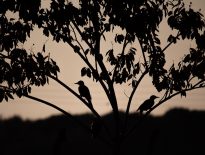Dear Amara, at the end of last year, I received the teary email you sent me, which I read and reread until my heart wept. Some situations are humorous in themselves. It is how you run to someone for consolation and they end up crying with you.
I swear to you, Amara, after I read that email, I wept for myself, and are we not all humans, was it not that you wrote to me so you could be the subject of pity?
It’s been a year now since I received your rants that the world isn’t for people like you, people like us, Amara. I saw in your mail that you wish to vanish, and for the first time, I am thankful that wishes are not horses, for if they were, even I would have ridden.
You said that your problems have suppressed you and I smirked. You had spent nearly three years fighting, fighting for a cause. A very bitter experience had led to it in the first place and in your words you said I would judge you, and that I would not know why you chose him. This decision has been less difficult for me by the sure knowledge that in our hard days, we escape from our dignity and sanity.
During my hard days, I have been comforted by tales of those whose crosses were heavier than mine. There has been no mental difference between me and them and between them and me.
Letter Dated for when You will Need It – A Creative Non-Fiction by Herman Owuor – Kenya
I spoke to you earlier about the grant I got, about how I immeasurably became the happiest person. Was it not that the organization credited me? That the next week diabetes visited my husband. That the other doctor said it was kidney failure. But we must not. We did not intend to allow those sluggish facts to blind us to fear.
But here is another question I have been asking myself; why exactly did I use that money to treat my husband’s lung disease, what happened to asking people for help? I know some will say with great sincerity, ‘What use is wealth without health?’ Maybe so, but it is for them to submit the proof that using that money wasn’t foolishness.
So far it is hard to be convinced that I am wise.
But yes, time does heal and things do get better as you get older. After all, the more mistakes you’ve made, the less likely you’d come up with new ones.
Amara, as long as you look back and see where you went wrong, you realize that there is little else you need to do. I am getting older too but not any wiser particularly. Once I accepted this some years back, I have been more forgiving and kinder towards myself and others.
Slaughtered by ‘Umndeni’ – A Creative Non-Fiction by Lukholo Mazibuko – South Africa
There is another point: I have not said that I deeply understand your situation, but I do sympathize with you Amara. I would say that there are two problems outstanding above all others in this world: the problem of foolishness and the problem of poverty; the foolishness that traps us and poverty that plagues us.
My son’s wife had been sick two years into their marriage. This sickness followed the month after I sold my car to start a business since my children were nothing to thank God for financially. It was how my son had called me to borrow money for an urgent surgery, as if he knew I had money. But there was the importance of learning from experience. There was nothing I could have said to him.
‘I do not have money Ebuka.’
Did I? There is another thing about lying, the pinch of it that is truth.
At long last, Ebuka’s wife died just before the church approved all protocols to send in money for the surgery. I wanted to believe that this kind of death was destined, that my money couldn’t have prevented it.
Amara, can you see now that if foolishness were measured, I would be a hero on the list? I wanted to learn from my mistakes. This was a thing I have had to judge entirely for myself. I have for ten years tried to kill my guilt. But you must believe when I tell you I have found it impossible to carry the heavy burden of blaming myself, for if I did, I wouldn’t be here.
I know that you say your problems are immeasurable, that the rich man you married in your late thirties lied to you. That he was living with cancer and he lived only two years after your marriage. I know that you blame yourself.
That was your own mistake, Amara. But what happened to the orphanages? I do not think it would be wise to leave all that wealth he has left you alone in sorrows. Do you know that ninety percent of orphanages do not have dogs in their compound? You could walk in at any time. What makes you a mother, Amara?
The Visit – A Creative Non-Fiction by Jessica Ireju – Nigeria
You still have a pen. I do not. I cannot rewrite my story to bring back my son’s wife, or apply for any more grants, or quench the gigantic fire that started from the shop beside mine.
But you, you still have the pen, do not let ageing take it from you.
…and I do not pity you Amara, I envy you, for you are sugar, surrounded by ants of possibilities.
—

Arike Priscilla Adesina believes that stories can change society, and she uses her writing to portray human experiences vividly. She won the 2023 Women Short Story Prize and recently completed a fellowship at Imodoye Writers Residency in 2024. Her book, The After Party, is a collection of short stories about common teenage crises. Some of her writings have been published in magazines and national newspapers. Priscilla lives between Minna, Niger State, and Abuja.







